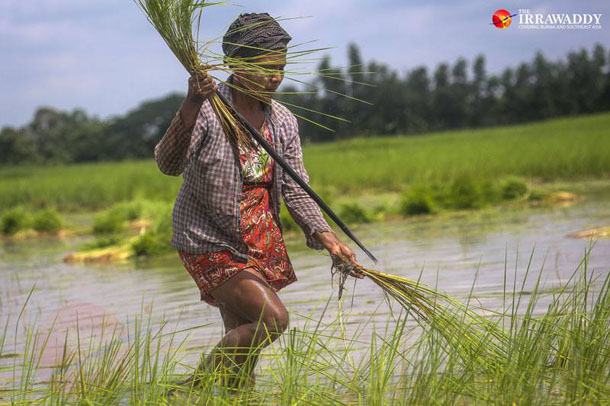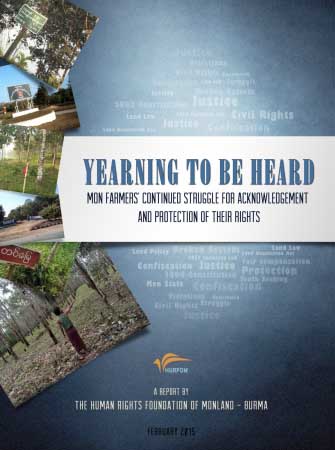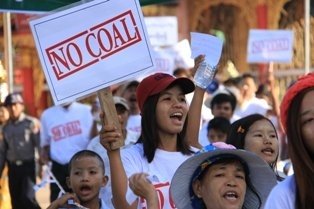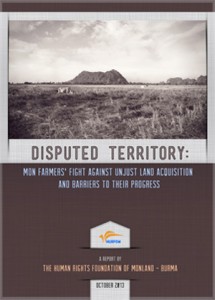Posts Tagged ‘Mon State’ (25 found)
WCRP releases “Inaccessible and Under-Resourced: Concerns Over Education in Rural Mon Communities”
 Moulmein, Mon State: At a presentation in Mon State capital Moulmein, the Women and Child Rights Project (WCRP), a project of the Human Rights Foundation of Monland (HURFOM) released a report entitled “Inaccessible and Under-Resourced: Concerns Over Education in Rural Mon Communities” […]
Moulmein, Mon State: At a presentation in Mon State capital Moulmein, the Women and Child Rights Project (WCRP), a project of the Human Rights Foundation of Monland (HURFOM) released a report entitled “Inaccessible and Under-Resourced: Concerns Over Education in Rural Mon Communities” […]
Land Policies and Laws Must Reflect Rights and Interests of Vulnerable Communities
 Amid the various serious issues currently dominating the headlines about Burma – including the upcoming elections, the escalation in fighting between the Burma Army and ethnic armies, the recent crackdown on workers’ protests, this year’s student marches, and ongoing religious tensions – it is important that people do not lose sight of the land issue. Like other developing South-East Asian countries, Burma is grappling with the sticky and complex problems of land ownership, rights and use. As is often the case, it is the poor and marginalized communities who are most vulnerable to exploitation and human rights abuses, particularly small-scale farmers in Burma’s beleaguered ethnic regions.
Amid the various serious issues currently dominating the headlines about Burma – including the upcoming elections, the escalation in fighting between the Burma Army and ethnic armies, the recent crackdown on workers’ protests, this year’s student marches, and ongoing religious tensions – it is important that people do not lose sight of the land issue. Like other developing South-East Asian countries, Burma is grappling with the sticky and complex problems of land ownership, rights and use. As is often the case, it is the poor and marginalized communities who are most vulnerable to exploitation and human rights abuses, particularly small-scale farmers in Burma’s beleaguered ethnic regions.
This month Human Rights Foundation of Monland-Burma (HURFOM) released a report titled “Yearning to be Heard: Mon Farmers’ Continued Struggle for Acknowledgement and Protection of their Rights” – a follow-up to their 2013 report “Disputed Territory: Mon Farmers’ Fight Against Unjust Land Acquisition and Barriers to Their Progress.” It argues that “continuing barriers to progress lie primarily in the country’s broken land management system, the failures of recent land laws to secure the protection of farmers’ land rights, the failure of government bodies and authorities to perform their responsibilities unbiased from military influence, and the total impunity of the military due to the independent structure of the courts-martial.” A salient example of such impunity, mentioned in the report, is the confiscation of more than 2,000 acres of rubber plantation in Thanbyuzayat Township, Mon State, over the past year. Regrettably, such land rights abuses betray the paltry extent to which the Burma Government is able to influence the Burma Army and rein in its illegal activities […]
• • •Yearning to be Heard: Mon Farmers’ Continued Struggle for Acknowledgement and Protection of their Rights
 Land conflict is the most pressing issue facing Burma today, second only to armed conflict. Though Burma’s emerging democratic government has introduced land policy reform and has established land investigation commissions aimed to resolve land conflicts, civilian land acquisition by the Burmese military continues to take place, particularly in Burma’ minority ethnic areas.
Land conflict is the most pressing issue facing Burma today, second only to armed conflict. Though Burma’s emerging democratic government has introduced land policy reform and has established land investigation commissions aimed to resolve land conflicts, civilian land acquisition by the Burmese military continues to take place, particularly in Burma’ minority ethnic areas.
Burma: Rights Heading in Wrong Direction
(Bangkok, January 29, 2015) – Burma’s human rights situation declined in 2014, setting back progress made since the reform process began three years ago, Human Rights Watch said today in its World Report 2015. Donors and influential governments have done little to pressure the army and government to keep reforms on track.
• • •Ethnic Communities: Salween Dams are Fueling War and Must be stopped
Community representatives from Shan, Karenni, Karen and Mon States are handing a petition today to the Myanmar Ministry of Electric Power, and to the Chinese and Thai Embassies in Yangon, urging an immediate halt to dam projects on the Salween River, which are fuelling war and violating the rights of local peoples […]
• • •Hundereds Protest against Planned Power Plant in Mon State
 More than 500 locals at Aunden Village in Mon State protested against a proposed coal-fired power plant project on Sunday.
More than 500 locals at Aunden Village in Mon State protested against a proposed coal-fired power plant project on Sunday.
Villagers shouted slogans, such as “No Aunden coal plant”, “Dismiss the Aunden coal power plant!”, “We don’t want Toyo-Thai Company!”, and “We don’t want coal plant in our area!” while marching through the town of Ye. […]
• •Disputed Territory: Mon Farmers’ Fight Against Unjust Land Acquisition and Barriers to Their Progress
 Over the years HURFOM has produced a number of accounts highlighting the hardships faced by Mon farmers who became victims of land confiscation or unjust land acquisition. In this report HURFOM follows-up on previously documented abuses and concentrates on an emerging new trend: farmers’ active and collective pursuits for rights to their land.
Over the years HURFOM has produced a number of accounts highlighting the hardships faced by Mon farmers who became victims of land confiscation or unjust land acquisition. In this report HURFOM follows-up on previously documented abuses and concentrates on an emerging new trend: farmers’ active and collective pursuits for rights to their land.
Disputed Territory aims to elaborate on the activities of and express solidarity with farmers who are resolutely, and in some cases for the first time, seeking justice regarding their land […]
HURFOM Releases “Disputed Territory” to Highlight Unjust Land Acquisition in Mon Areas
The Human Rights Foundation of Monland (HURFOM) has released a report titled “Disputed Territory: Mon farmers’ fight against unjust land acquisition and barriers to their progress,” to illustrate contemporary struggles against past and on-going land disputes. Drawing from almost 100 interviews conducted in Ye, Yebyu, and Kyaikmayaw townships, the report presents cases of land confiscation and abuse in Mon areas and elevates the voices of farmers who are actively pursuing justice […]
• • •Bitter Pills: Breaking the Silence Surrounding Drug Problems in the Mon Community
 In late 2012 the New Mon State Party (NMSP) initiated a vigorous anti-drugs campaign throughout various Mon communities in Burma. Arrests of numerous drug smugglers were made, drug-using youth were sent to NMSP rehabilitation centres, and signs were erected in villages calling on residents to resist and combat drug use. This wave of action brought an issue to the table that had thus far been surrounded by silence from relevant authorities. Prior to this, domestic and international discussions of Burma’s drug problems had largely been restricted to regions in Upper Burma, in particular Shan State. However, NMSP action highlighted that drugs were also prevalent in Mon communities and were being abused by Mon youth […]
In late 2012 the New Mon State Party (NMSP) initiated a vigorous anti-drugs campaign throughout various Mon communities in Burma. Arrests of numerous drug smugglers were made, drug-using youth were sent to NMSP rehabilitation centres, and signs were erected in villages calling on residents to resist and combat drug use. This wave of action brought an issue to the table that had thus far been surrounded by silence from relevant authorities. Prior to this, domestic and international discussions of Burma’s drug problems had largely been restricted to regions in Upper Burma, in particular Shan State. However, NMSP action highlighted that drugs were also prevalent in Mon communities and were being abused by Mon youth […]
New HURFOM Report Highlights Use and Trading of Drugs in the Mon Community
The Human Rights Foundation of Monland (HURFOM) released a report on drug problems in the Mon community, drawing on testimony from 140 individuals. The report aims to give a preliminary account of drug use and trading in Mon populations, exploring issues that range from the causes of rising youth drug use to the New Mon State Party’s (NMSP) recent anti-drugs campaign. HURFOM’s aim is to encourage a new focus on the issue, breaking a long-held silence to call for collaborative action from all relevant authorities […]
• • •








 All posts
All posts